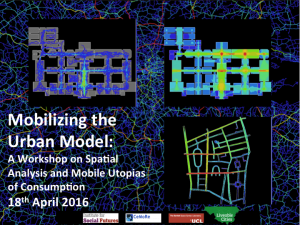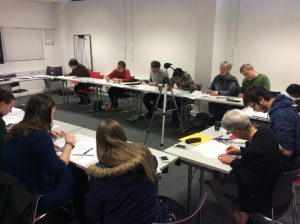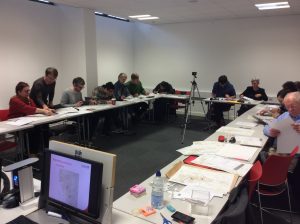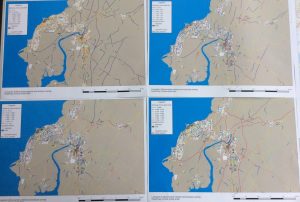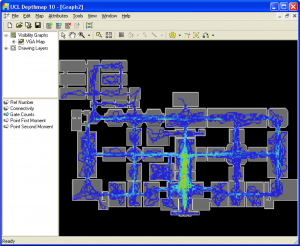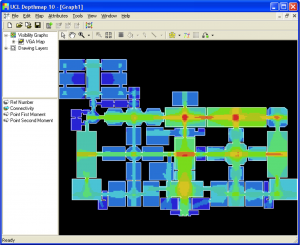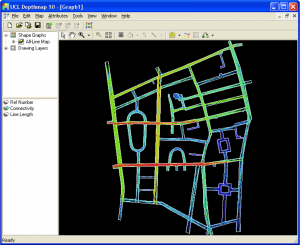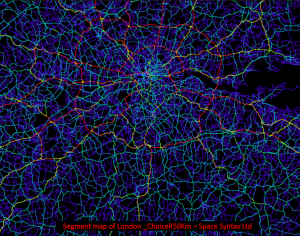Mobilizing the Urban Model
Please see here for List of Participants
Mobilizing the Urban Model: A Workshop on Spatial Analysis and Mobile Utopias of Consumption at the Institute for Social Futures, Lancaster University (Bowland North, SR 07)
9:30 – 15:00 18th April 2016
All are welcome. Places are limited at this free-to-attend event and we encourage early registration. Please submit a short biography and statement or research interests when you register here.
For more information visit our Mobile Utopia Project Website
Motivation
‘Where do you live and work, where do you shop in 2051?’ The aim of this workshop is to explore mobilities of urban consumption through a mixed methods approach, combining the emerging and fast-developing method of spatial analysis with an experiment in utopia as method. You will have a unique chance to get to know UCL space syntax software, receive instruction on its use and experiment with it, discuss its relevance to social science and co-create map of Lancaster, as well as learn more about urban space, spatial analysis, mobile consumption and futures thinking. This event is part of the Liveable Cities Project contributes to the Mobile Utopia Project, led by the Institute for Social Futures (ISF) and the Centre for Mobilities Research (CeMoRe) at Lancaster University.
Programme
| 9:30 – 10:00 | Welcome & Introductions
Short presentations on |
| 10:00 – 10:45 | Utopia as method – participant shopping basket and map-making of mobility and consumption |
| 10:45 – 11:30 | Space syntax: introduction to theory and methods – Jamie O’Brien |
| 11:30 – 12:00 | Depthmap model (Lancaster): Depthmap & landuse overlay (QGIS) |
| 12:00 – 12:45 | Lunch/chat |
| 12:45 – 15:00 | Discussion I: “What can we see in the model?”
Discussion II: “Is the model useful? Discussion III: “Mobile consumer utopia” Conclusions & next steps |
The workshop is led by Monika Buscher, Zofia Bednarowska, and Jamie O’Brien
We look forward to working with you.
If you have any questions, please contact Zofia Bednarowska: z.bednarowska@lancaster.ac.uk
List of Participants
Zofia BednarowskaZofia is a PhD student in the Department of Sociology, Economy, Education and Methods of Social Research at the Institute of Sociology at the Jagiellonian University in Kraków and Researcher in Centre for Evaluation and Analysis of Public Policies of the Jagiellonian University. She is currently visiting PhD student at Centre for Mobilities Research, Department of Sociology, Lancaster University. A She holds a BA in Interfaculty Studies in Humanities, an MA in Political Science and an MA in Sociology from the Jagiellonian University in Kraków. She was a participant in the interdisciplinary Ph.D. studies „Society – Environment – Technologies”. Graduate of the Essex Summer School in Social Science Data Analysis in 2014. In 2015, she completed research stay as a Visiting scholar at University at Buffalo, NY. She also worked for 5 years in a market research agency as a research executive, responsible for the management and execution of research projects, as well as for research design and data analysis. Her research interests are focused on consumer behaviour theory, sociology of space, spatial analysis, in particular spatial statistics, geostatistics, data visualisation, test pricing, methodologies of market research in social and consumer behaviour analysis. |
|
Alan BeattieCumbria-born, as a schoolboy was a singer-actor-dancer regionally and around Europe. Six years at Oxford in biomedical studies and research overlapped with training and work with Royal Ballet. Was a founder-member of London Contemporary Dance Theatre, and went on to make his own experimental choreographies, exploring dance-sculpture-architecture and dance-health-community. Lectured in London Schools of Art etc on science/maths of complexity as approach to art and environment. Researched (and critiqued!) computer-aided hospital planning and design for NHS, and was one of the team of three at UCL that originally developed Space Syntax (‘Morphology of Complex Buildings and Building Complexes’) 1973-75. Switched back to Medical School, then worked in public health, child health, mental health in NHS and voluntary agencies across UK and overseas; taught at UCL, KCL; helped establish ‘clearing house’ for community action initiatives for health (LCHR 1981; NCHR 1988). Came to Lancaster 1988, always part-time (while working in the community): at Centre for Health Research 1989-2005, CeMoRe 2005-15, ISF 2015; Emeritus Professor of Public Health & Health Education at Cumbria University. Currently interested in ecosocial futures at global and local levels (eg in Cumbria) and especially – in this context – in new ways of mobilising community activism, by (perhaps) drawing on the resources of experimental writing and performance. |
|
Dr Chris BoykoUrban Design and Behaviour, Cities, Digital Technology/Internet of Things, Regeneration, Space and Place, Town Planning, Urban Sustainability, Wellbeing. Christopher is a Lecturer in ImaginationLancaster. His general research and teaching interests include decision-making processes; design thinking; Internet of Things/ digital technology use in cities; public space design, use and management; regeneration; research methods; sustainability; town planning; urban design; and wellbeing. Christopher is currently examining wellbeing on a 5-year, £6 million EPSRC project called Liveable Cities. In between these projects, Christopher co-wrote a government report about the impacts of the physical environment on mental well-being. Finally, he has been working on a Lancaster University Early Career Grant with colleagues in Sociology (Monika Buscher, Tim Dant, Karenza Moore) and LICA (Jen Southern), studying key changes in the ‘interaction order’ of public spaces. |
|
Monika BuscherMonika is Professor of Sociology at Lancaster University, Director of the Centre for Mobilities Research and Associate Director at the Institute for Social Futures. Her research explores the digital dimension of contemporary ‘mobile lives’ with a focus on IT Ethics. She combines qualitative, ethnographic studies, social theory, and design through mobile, ‘inventive’ methods, and stakeholder engagement. Her theoretical orientation builds on mobilities research, phenomenology, ethnomethodology, science and technology studies, feminist and non-representational theory, design research. She edits the book series Changing Mobilities (Routledge) with Peter Adey. |
|
Joe DevilleJoe Deville is a Lecturer in Mobile Work, based jointly in the Department of Organisation, Work and Technology and the Department of Sociology. His research interests include:
He is also a co-director of the Centre for Mobilities Research, an Associate of both the Data Science Institute and the Institute for Social Futures, an editor and co-founder of the Charisma Network, and an editor at Journal of Cultural Economy. |
|
Camila dos Santos MoraesPhD visiting student at CeMoRe and Sociology for the 2015-16 academic year. Visiting Student in the PhD Sociology Program at Lancaster University under John Urry’s supervision with the research project entitled ‘Ecological Slums? Environmental concerns and tourism mobilities in Rio de Janeiro favelas’. PhD student in History, Politics and Culture, Getulio Vargas Foundation (FGV), Brazil (2013-2017). Previous Degrees: Masters in Social Sciences, State University of Rio de Janeiro (UERJ), Brazil (2009-2011). Specialist in Urban Sociology, State University of Rio de Janeiro (UERJ), Brazil (2008-2009). Bachelor in Tourism – Federal State University of Rio de Janeiro (UNIRIO), Brazil (2003-2007). Activities: Lecturer in the Tourism and Heritage Department at Federal State University of Rio de Janeiro (UNIRIO) Rio de Janeiro, RJ, Brazil. Research interests: favelas, environment, culture and tourism Current Research – “Ecological Slums? Environmental concerns and tourism mobilities in Rio de Janeiro favelas” |
|
Jill EbreySociology Dept, the University of Manchester. From 2014 – 2015 Jill worked as a Research Associate on the ‘Understanding Everyday Participation’ research project in Aberdeen where she undertook an ethnography, conducted interviews and focus groups and made a film. Jill hopes to continue this work through the ‘translation’ of UEP (Aberdeen) project research findings into policy and practice Jill has begun recently to think through some ideas on Utopia and the everyday. In May 2015 (Bristol), she gave a paper at Utopias, Futures and Temporalities: critical considerations for social change entitled Everyday Utopias – Place, Participation and Cooperation in Aberdeen. UEP has recently been awarded a small AHRC grant for the 2016 Connected Communities festival where the team plan to work with their friends in Scotland to produce and publish a ‘Futures Primer’. |
|
Kim KnottI work in the Department of Politics, Philosophy and Religion at Lancaster where I am Professor of Religious and Secular Studies. I have worked on religion, place and space for more than a decade (amongst other things), have devised a spatial methodology for studying religious/secular relations which I have applied in various contexts (and taught to others internationally). I have a longstanding interest in mapping – empirical and metaphorical – and for many years led a module on ‘The religious mapping of Leeds’ in which we built up a map of key neighbourhoods in the city in terms of their religious profile and the place of religion within their social, economic, political, educational and cultural life. |
|
Louise MullaghResearch student at Computing and Communications, InfoLab21 at Lancaster University. ‘Is open enough? Towards context aware open data practices. (working title) My research explores contexts of open data re-use; focussing specifically on people and places. Data can be considered an abstract phenomenon, but is increasingly impacting upon our everyday lives. Furthermore, it exists in a “non-place”, in data centres far removed from our view and used by people with the skills and infrastucture to do so. I am interested in discovering whether it is possible to develop a context aware open data practice that challenges current dominant practices, such as the hackathon or data drive, one which engages people and places.’ |
|
Dr Jamie O’BrienJamie is a Senior Research Associate at The Bartlett School of Architecture, CeMoRe Fellow for 2016. He holds undergraduate degree in Fine Art & Critical Theory, an Engineering Doctorate from UCL. He is working in Bartlett Space Syntax Laboratory, which is the international centre. Its team of researchers study the effects of spatial design on aspects of social, organisational and economic performance of buildings and urban areas, uniquely combining the creation of software for spatial analysis and design with observation of function. Its theoretical and methodological innovations intersect with a variety of disciplines. Space syntax software is now used by a growing worldwide research and design community, supported by open source software: UCL Depthmap. More on: http://www.bartlett.ucl.ac.uk/space-syntax |
|
Cosmin Popan‘I am a PhD candidate in Sociology at Lancaster University, working within an interdisciplinary research project, Liveable Cities. My thesis investigates the possibilities for everyday urban cycling to become a socio-technical system that replaces automobility. This exercise requires two necessary conditions: a utopian vision and a de-growth agenda. My thesis focuses on three aspects of a putative bicycle system: cycling sensescapes: how senses operate differently, how some are awakened and others reconfigured, how sensory tolerances are built; sociabilities of cycling together, creating the skills and confidences needed for a successful mass practice; and infrastructures, both physical and non-physical, whose promises of speed and progress I challenge’. |
|
Satya SavitzkyPhD Candidate, Lancaster Center for Mobilities Research at Lancaster University Currently investigating intersections between globalisation and climate change in the (re)emergence of a ‘Northern Sea Route’ through the Russian Arctic, which some speculate could soon rival or replace the Suez Canal as major global trade artery, with likely seismic geoeconomic and geopolitical consequences. My research explores turbulence in the transitional spaces of distributive capitalism, focusing on attempts to carve ‘lines’ through a non-linear environment, and probing the role played by melting sea-ice in the making of especially fragile futures. The research also examines the role of anticipated futures in the making of the present-day Arctic. |
|
Jen SouthernLecturer, Creative Director Jen Southern is an artist and lecturer in Fine Art and New Media at Lancaster University. She has a practice-based PhD in Sociology from the Centre for Mobilities Research, where she is now artistic director. Her research is a combination of arts practice, mobilities research and speculative software design. She works within the field of mobilties research, with a particular interest in the collaborative use of GPS, both in creative practice, the design of the app ‘Comob Net’, and in rescue situations. As creative director of CeMoRe and mobilities.lab she is currently developing a workshop on mobilities and art for spring 2015, and co-editing a special issue of Mobilities Journal. |
|
Zoya StreetI am a historian, linguist and writer for games and playful art. My writing looks at play, games and software within material and symbolic systems of every scale: from the tiny emotional loops of caring for a virtual pet, to the massive macro network of meaning making in late capitalism. I am a PhD student in sociology at the University of Lancaster, studying the history of games in the years 1998-2008, specifically the emerging networks of mobile, social and indie game production and consumption. I currently have a mobile game project in the works that focuses on teaching a fictional language as a form of storytelling, to place users into a state of cultural immersion in a utopian imagined future of Yorkshire. |
|
Vanessa F. SehaberI am a PhD student from Federal University of Paraná State, in Curitiba, Paraná State, Brazil. I am a visiting student at Lancaster University and my research addresses the Epidemiological Surveillance, where I am working with spatial statistical methods to explain the occurrence of a disease. I am Bachelor of Statistics and I have worked with design of experiments, survival, spatial and multivariate statistics analyses.
|
|
